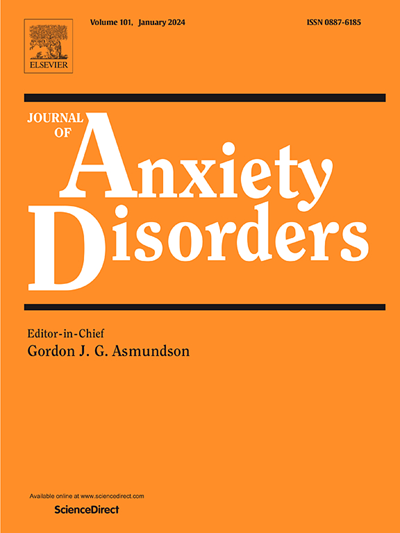How strongly are trait positive and negative affectivity associated with anxiety symptoms? A multilevel meta-analysis of cross-sectional studies in anxiety disorders
IF 4.8
2区 医学
Q1 PSYCHIATRY
引用次数: 0
Abstract
There are well-established theoretical and empirical foundations for a negative association between trait positive affectivity and anxiety symptoms in anxiety disorders and a positive association between trait negative affectivity and anxiety symptoms, respectively. However, no previous meta-analysis systematically estimated to what extent trait positive and negative affectivity are associated with anxiety symptoms in anxiety disorders. The aim of this study was to conduct a systematic review and meta-analysis to obtain an evidence-based estimate of the associations between trait positive and negative affectivity with anxiety symptoms in anxiety disorders. We performed a systematic search including studies reporting estimates of the associations between trait positive and negative affectivity measures and anxiety measures in clinical populations that suffer from at least one anxiety disorder. We identified 13 and 14 eligible studies, documenting 19 and 21 mainly unpublished effect sizes from 1489 individuals that suffer from an anxiety disorder. We estimated an overall correlational effect size (r) using multilevel meta-analytic models accounting for within- and between-study variance components. The results of the omnibus models showed a small to moderate negative association between positive affectivity and anxiety symptoms (r = -0.19, 95 % CI [-0.30, −0.09]) and a strong positive association between negative affectivity and anxiety symptoms respectively (r = 0.53, 95 % CI [0.44, 0.61]). These associations are different from each other (r = .35, p < .001). The results are consistent with theoretical claims that anxiety disorders are highly associated with negative affectivity but to a lesser extent with positive affectivity. More research and systematic documentation are necessary to determine moderators of these overall associations.
特质的积极和消极情感与焦虑症状的关系有多密切?焦虑症横断面研究的多水平荟萃分析。
焦虑症患者的特质积极情感性与焦虑症状之间存在负相关,而特质消极情感性与焦虑症状之间存在正相关,这两者之间分别存在负相关和正相关。然而,以往的荟萃分析并没有系统地估计特质积极情感性和特质消极情感性在多大程度上与焦虑症的焦虑症状相关。本研究旨在通过系统性回顾和荟萃分析,对焦虑症患者的特质积极情感和消极情感与焦虑症状之间的关系进行循证估算。我们对至少患有一种焦虑症的临床人群进行了系统性检索,其中包括报告特质积极和消极情感测量与焦虑测量之间关系估计的研究。我们发现了 13 和 14 项符合条件的研究,分别记录了 19 和 21 个主要未发表的效应大小,研究对象为 1489 名焦虑症患者。我们使用多层次元分析模型估算了总体相关效应大小 (r),并考虑了研究内部和研究之间的方差成分。综合模型的结果显示,积极情感性与焦虑症状之间存在小到中等程度的负相关(r = -0.19,95 % CI [-0.30,-0.09]),而消极情感性与焦虑症状之间则存在较强的正相关(r = 0.53,95 % CI [0.44,0.61])。这些关联彼此不同(r = .35,p
本文章由计算机程序翻译,如有差异,请以英文原文为准。
求助全文
约1分钟内获得全文
求助全文
来源期刊

Journal of Anxiety Disorders
Multiple-
CiteScore
16.60
自引率
2.90%
发文量
95
期刊介绍:
The Journal of Anxiety Disorders is an interdisciplinary journal that publishes research papers on all aspects of anxiety disorders for individuals of all age groups, including children, adolescents, adults, and the elderly. Manuscripts that focus on disorders previously classified as anxiety disorders such as obsessive-compulsive disorder and posttraumatic stress disorder, as well as the new category of illness anxiety disorder, are also within the scope of the journal. The research areas of focus include traditional, behavioral, cognitive, and biological assessment; diagnosis and classification; psychosocial and psychopharmacological treatment; genetics; epidemiology; and prevention. The journal welcomes theoretical and review articles that significantly contribute to current knowledge in the field. It is abstracted and indexed in various databases such as Elsevier, BIOBASE, PubMed/Medline, PsycINFO, BIOSIS Citation Index, BRS Data, Current Contents - Social & Behavioral Sciences, Pascal Francis, Scopus, and Google Scholar.
 求助内容:
求助内容: 应助结果提醒方式:
应助结果提醒方式:


